How to Certify Your Training Program
FAQs
Many T&D PowerSkills clients are interested in providing a Certification to their employees who successfully complete an in-house training program. Programs offering Certifications are often seen as more valuable to employees than Programs without them. There is a lot of confusion in the Industry as to what constitutes a ‘Certified Training Program’ and what that exactly entails. Hopefully, this Q&A will help clarify your options.
Are the T&D PowerSkills materials certified?
No. Training ‘Programs’ are Certified, not the material, itself. The T&D PowerSkills material is intended to be used as a foundation for Training Programs – the ‘Program’ itself must be established by each Company and includes much more than just training material.
What do you mean by ‘Certifying Authority’?
A ‘Certifying Authority’ is any organization that is qualified to Certify training programs and individuals. Your Company can be a Certifying Authority, The U.S. Department of Labor, Bureau of Apprenticeship and Training is a Certifying Authority, the American Red Cross is a Certifying Authority, some state Department of Labor Agencies are Certifying Authorities, etc. It can go on and on.
Will my Company be recognized as a ‘Certifying Authority’?
Probably not. And your employees (or other companies) probably won’t see a lot of value in just a Company Certificate of Training. Since the quality of the Program hasn’t been reviewed by a respected, independent training group, it’s difficult to place a lot of value on the training received by the employees and so the Company Certificates don’t mean much.
Does T&D PowerSkills sell training ‘programs’?
No. However, we can recommend an organization that has helped utilities and contractors develop in-house lineworker training programs that have gone on to be accepted by Certifying Authorities, and thus become Certified Programs. The Institute for Safety in Powerline Construction (ISPC) is a non-profit ‘sister’ organization to T&D PowerSkills and can be found at ispconline.com or reached via email here.
Can my Company be a ‘Certifying Authority’?
Yes. OSHA says that a Company can certify the training received by employees from an in-house training program and issue a Certificate accordingly. OSHA is okay with the Company deciding what training each employee needs.
How can I improve the value my employees receive in the Certification provided for our lineworker training program?
We see two primary options for wider recognition of a Certified Lineworker Program:
Apply to the U.S. Department of Labor, Bureau of Apprenticeship and Training (DOL State) or to the equivalent State Agency (SAC State) for Program Certification.
Contract with ISPC to Certify your Lineworker Program.
Advantages of a U.S. DOL Certification
Widely recognized as a Certifying Authority
Record keeping standardized and maintained by the U.S. Dept. of Labor
Program parameters standardized to the U.S. DOL expectations
Reporting requirements standardized to the U.S. DOL requirements
U.S. Government Certificate upon completion
Advantages of an ISPC Certification
Recognized as an independent authority
Record keeping may be customized to Company needs – on-line availability
Program parameters may be customized to Company needs
Reporting requirements may be customized to Company needs
Company decides all matters relating to employee compensation and stepped raises
No specific recruiting requirements
Company decision to enroll or remove employees – not the governments
ISPC Certificate upon completion
Disadvantages of a U.S. DOL Certification
Submittal of complex application ‘Standards’ required
Somewhat inflexible with requirements for Program features
Cumbersome process for enrolling employees and removing them from Program – appeals process for employees
No online record keeping options
Includes scheduled wage rates and programmed stepped raises based on where employees are in the Program and how they advance
Must demonstrate that Company has attempted to recruit females and minorities into the Program
Disadvantages of an ISPC Certification
Consulting Project Service Agreement, with fees required
Routine program and student progress review required
ISPC SME evaluates graduate candidates prior to award of Journeyman Lineman Certificate
Program may be audited by ISPC Subject Matter Experts and Consultants at ISPC’s discretion
T&D PowerSkills recommends either of these two options in Certifying a Lineworker Training Program. Choose the option that fits your Company’s needs the best.
